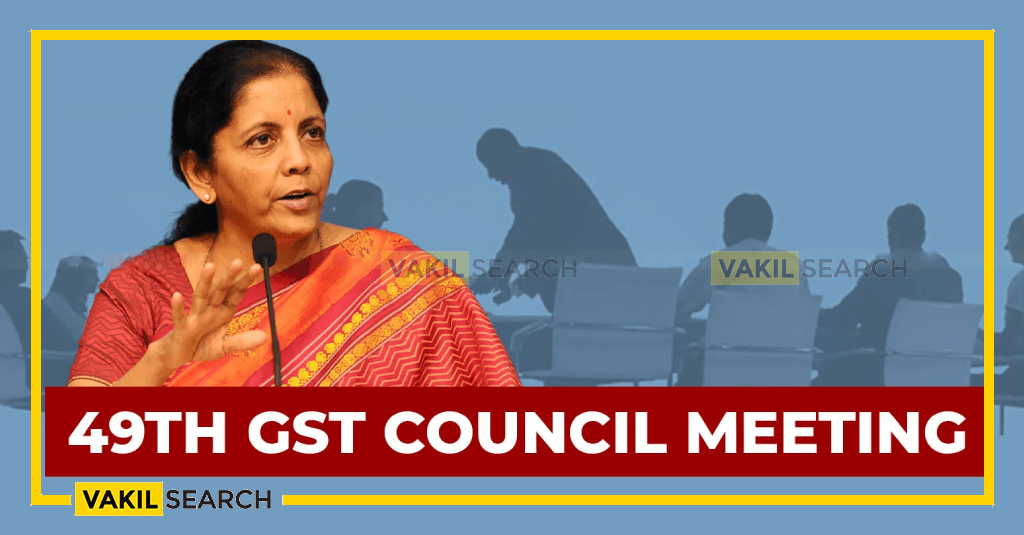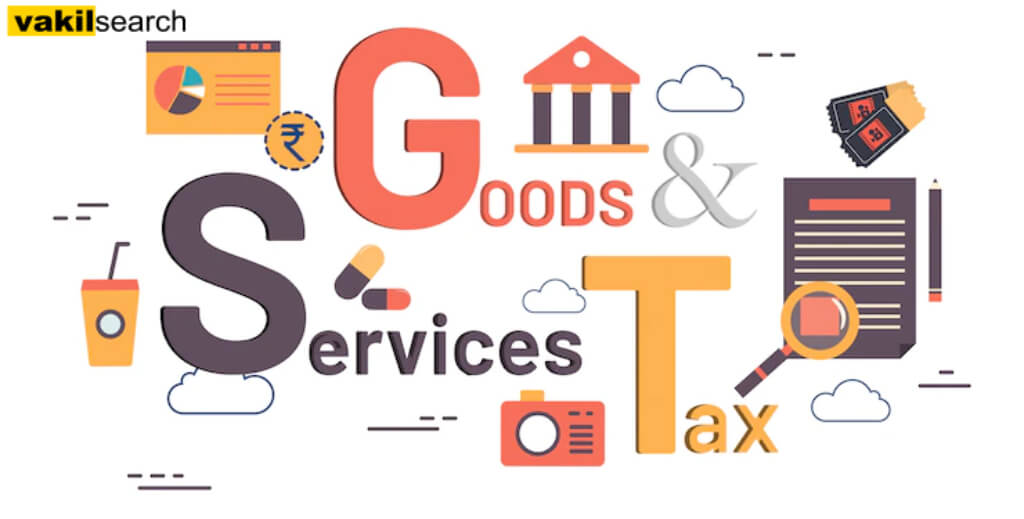The Council meeting was followed by a press conference highlighting the key decisions taken during the meeting, including the decriminalization of GST offences and measures to simplify GST compliance. Let's examine them in more detail.
GST Council Latest Update:
-
49th GST Council
The 49th meeting of the GST Council is taking place subsequent to the unveiling of the Union Budget earlier this month. The budget included a proposal to prolong the interest-free loan to states for an additional year, spanning a 50-year period.
-
49th GST Council Meeting to Take Place on 18 February 2023; Know What to Expect!
The GST Council will hold its 49th meeting on 18 February 2023 in New Delhi. This will be the third meeting to take place immediately after the presentation of the Union Budget 2023 and the first one since the last meeting on 17 December 2022.
Nirmala Sitharaman, the Union FM, will be the chairperson of the meeting. The agenda of the meeting may include discussions on the taxation of gutkha and pan masala businesses, the setting up of GST appellate tribunals, and the imposition of GST on online gaming, casinos, and horse racing. The government aims to increase tax collection by expanding the taxpayer base, with the current monthly GST collections averaging around ₹1.4 lakh crore and 1.40 crore taxpayers registered under GST. Around the Budget 2023, many industries proposed indirect tax rate cuts, with 54% of participants in a survey hoping for GST exemptions for essential items and 44% hoping for a GST reduction.
GST Council Key Highlights
-
49th GST Council Meeting Highlights
On February 18th, 2023, the 49th meeting of the GST Council was held at Vigyan Bhawan, New Delhi, marking the first meeting following the presentation of Budget 2023. As the third meeting to be held in the same month as the budget presentation, the 49th meeting was closely watched as important decisions were expected. The Union FM later briefed the press on the key decisions made during the meeting:
-
- Two GoM reports were accepted, one with slight modifications and amendments will be made in the language of the Finance Bill
- All pending GST compensation dues for June 2022, totaling ₹16,982 crore, will be cleared on the day of the meeting itself, funded by central government resources and recouped from future compensation cess collections. An additional ₹16,524 crore will be released to states upon receipt of the AG’s certificate
- GST rate cuts were approved for Rab/Liquid jaggery, from 18% to nil when sold loose and 5% when sold packaged, as well as for pencil sharpeners, from 18% to 12%
- GST on tracking devices fixed on durable containers will be nil, subject to certain conditions
- Reverse charge basis tax levy will be imposed on services provided by registries of courts/tribunals for commercial use and local bodies
- Coal rejects supplied by and to the washeries will be exempt from GST
- Late filing fees for annual returns (GSTR-9/9C) were rationalized for FY 2022-23, with registered persons with an Aggregate Annual Turnover (AATO) of up to Rs.5 crore charged a daily fee of ₹25, subject to a maximum cap of 0.02% of turnover per Act, and those with AATO of more than ₹5 crore to 20 crore charged ₹50 per day, subject to a maximum cap of 0.02% of turnover per Act
- A GST amnesty scheme was announced for delayed GSTR-4, GSTR-9 & GSTR-10 returns with reduced late fees
- The possibility of a special composition scheme was considered for certain sectors, such as pan masala and Gutkha
- The GoM report on the appellate tribunal was accepted with modifications and will be re-drafted and circulated among GST Council members for approval
- The issue of MUV classification in line with SUVs was not discussed due to time constraints
- The fitment committee will further study the possibility of GST on cement, while the GST rate cut on millet-based health products required more discussion.
- The GoM recommended a single bench for the GST appellate tribunal, with the primary bench in Delhi and benches in every state. Each appellate tribunal bench will have a four-member bench, consisting of two technical members and two judicial members, with representation from the centre and states at 50% each.
- Modifications will be made to the selection process for members of the judicial panel, with some members of the GST Council requesting more state representation.
- The GoM report on pan masala was accepted without modifications.
- The GoM report on online gaming could not be discussed due to the absence of the Meghalaya FM heading the committee.
-
48th GST Council Highlights
-
- GST Offences are now Punishable by Upto Rs.2 Crores, except in cases of fake invoices.
- Blended Petrol is subject to 5% GST on Ethanol.
- The federal government has decriminalized certain offences, such as obstruction of service by officers, failure to provide information, etc.
- Unregistered Suppliers can Sell goods through e-commerce Portals.
- Insurance Companies do not charge GST on No Claim Bonuses.
- GST Appellate Tribunal has not yet reached a decision
- In the next GST Council Meeting, both GoM reports on Pan Masala, Gutka, and GSTAT will be discussed.
The final resolution and report from the 48th GST Council Meeting have been approved by the Council. Offenses, e-commerce registration, and tribunal establishment have all been discussed during the 48th GST Council meeting. State ministers were invited to the meeting via video conference on December 17, 2022.
GST Council Overview:
On 17 December, the GST Council held its 48th meeting virtually. The meeting was chaired by Smt. Nirmala Sitharaman (Union Finance Minister), and attended by Shri Pankaj Choudhary, Union Minister of State for Finance, as well as finance ministers of state and union territories. Senior Ministry of Finance officials, as well as state and UT representatives, attended the meeting.
Regarding decriminalizing GST-related offences, the Council proposed raising the threshold from ₹1 crore to ₹2 crores for launching a prosecution under GST. It would apply to all cases except invoices issued without the provision of goods or services. Additionally, the Council proposed to reduce the compounding amount from 50% to 150% of the tax amount to 25% to 100%. In addition, certain offences would be decriminalized, including obstruction of an officer in the discharge of their duties, the deliberate falsification of evidence, and failure to provide information, as required.
In addition, the Council proposed to facilitate the use of e-commerce by micro-enterprises. This decision is based on the in-principle approval granted at the previous Council meeting allowing unregistered suppliers and composition taxpayers to make intra-state supplies of goods through an e-commerce operator. As a result of the GST Council’s approval, both the GST Act and the GST Rules have been amended to enable the same. The scheme may be implemented on 1 October 2023.
Input Tax Credit Reversal
According to the second provision of Section 16 of the CGST Act, the GST Council has recommended amending Rule 37(1) of the CGST Rules, 2017 with retrospective effect from 1 October 2022. In this amendment, the input tax credit (ITC) will be reversed proportionately to the amount not paid to the supplier concerning the value of the supply, including the tax due.
Additionally, the Council recommended that Rule 37A be added to the CGST Rules, 2017. This will provide a mechanism for reversing ITC by taxpayers who have yet to pay the tax amount by the specified deadline. It will also provide the mechanism for reclaiming such ITC if the supplier subsequently pays tax. As a result, compliance with Section 16(2)(c) of the CGST Act, 2017 will be made more accessible.
Streamlining GST Compliance Measures
Additionally, the GST Council proposed measures to streamline compliance with the GST law. It was proposed to conduct a pilot program in Gujarat for biometric-based Aadhaar authentication and risk-based physical verification of registration applicants. This move will likely contribute to the reduction of the number of fake or fraudulent registrations.
In combat fraudulent registrations, another step would be to capture the PAN-linked mobile number and email address from the CBDT database and enter them into Form GST REG-01. An OTP-based verification will also be conducted at the time of registration on the mobile number and email address to prevent unscrupulous fraudsters from misusing a person’s PAN.
In addition, the government intends to amend Sections 37, 39, 44 and 52 of the CGST Act, 2017, to restrict the filing of returns or statements to a maximum of three years from the filing deadline. In addition, Form GSTR-1 would be amended to provide for reporting details of supplies made through e-commerce operators covered by section 52 and section 9(5) of the CGST Act, 2017.
There will also be a new Rule 88C and Form GST DRC-01B introduced in the CGST Rules, 2017 to inform taxpayers when the difference between the liabilities reported by the taxpayer in Form GSTR-1 and GSTR-3B for a particular tax period exceeds the specified limits. In this way, taxpayers will be able to either pay the differential liability or explain it.
Under Rule 59(6) of the CGST Rules, 2017, a clause (d) will be added to restrict the filing of Form GSTR-1 for a subsequent tax period if the taxpayer has not deposited the amount specified in the intimation or provided an explanation. Tax officers would not be required to intervene if taxpayers paid or explained the reasons for differences in liabilities reported.
Decisions That Are Taken in Other Key Areas
A number of other decisions were taken by the GST Council, such as clarifying that the ‘No Claim Bonus’ offered by insurance companies will be deductible for the valuation of insurance services. No GST will apply to the same. In the case of a residential dwelling rented to a registered individual, there will be no GST payable if it is rented in their personal capacity and on their own behalf, that is, not for business purposes. Furthermore, incentives paid by the Central Government to banks under the scheme for the promotion of RuPay Debit Cards and low-value BHIM-UPI transactions will not be subject to tax.
To reduce tax evasion, the GST online registration Council also decided to include the supply of mentha arvensis under reverse charge. Additionally, a higher rate of compensation cess of 22% will be applied to SUVs whose engine capacity exceeds 1500cc, ground clearance exceeds 170mm, and whose length exceeds 4000mm.
To eliminate ambiguity and legal disputes on various issues, the following circulars will soon be issued:
- During fiscal years 2017-18 and 2018-19, the following procedure is followed for verifying input tax credits availed in GSTR-3B versus GSTR-2A.
- Provide clarification regarding the redetermination of demand under Section 75(2) of the CGST Act, 2017.
- Clarification regarding the applicability of e-invoicing for a particular entity.
The GST rate was also reduced, and certain rate clarifications were provided. Despite this, no increases in GST rates were announced at this meeting of the GST Council. Unregistered persons under GST are also expected to receive new refund rules if their construction contracts or long-term insurance policies are cancelled










